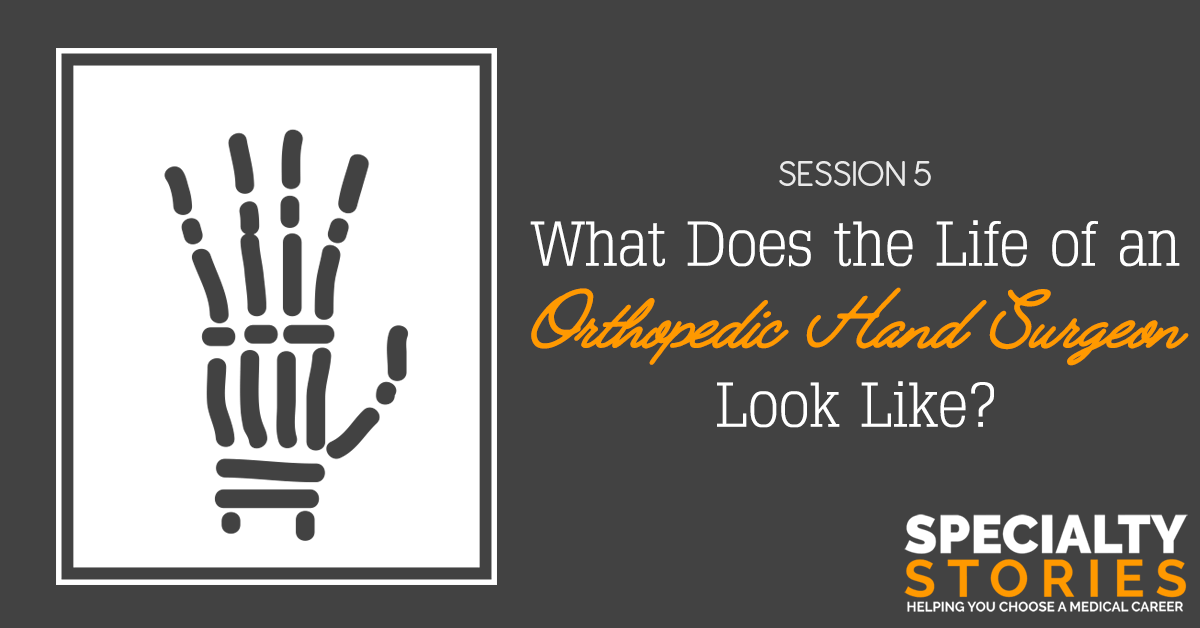Join us for MappdCon | Free Virtual Pre-Health Conference on Sept 13 Save Your Seat

In this week’s episode, Ryan talks with Ragu, an orthopedic hand surgeon who works in a hybrid setup. He’s in a community-based hospital and program, but he has residents he interacts with who rotate through the hospital. He has been practicing for almost two years.
[Related episode: What Does a Community-Based Joint Replacement Specialist Do?]
There are a lot of subspecialty options if you're training in orthopedic surgery: sports, joint replacements, shoulder, knee, hand, children, and so on.Click To TweetEach of these specialties are linked to other Specialty Stories interviews we’ve done with physicians in the fields Ragu was considering:
1-2 out of 20 people that he sees
[Related episode: Interview With a Private Practice General Orthopedist]
In the past, DO applicants were not getting proper consideration. In recent years, DOs are starting to get more recognition as being just as competent as MD applicants.
Generally, there is still a slight bias against DO applicants applying to MD orthopedic programs.
Orthopedists are capable physicians, and they do understand some medicine. More primary-care doctors should give them some credit in regards to that.
If primary-care physicians take a little bit of initiative to learn the basics of the musculoskeletal exam, they can actually examine their patients and be able to direct them to an orthopedic surgeon appropriately, instead of just sending them without even having seen the patient.
If primary-care physicians take some initiative to learn the basics of the musculoskeletal exam, they can actually examine their patients and be able to direct them to an orthopedic surgeon appropriately.Click To TweetResearch and development of orthopedic implants and products (such as bone cements)
Seeing and interacting with patients and giving a solution to a problem that’s been plaguing them for months or years
Yes. He loves orthopedics and hand orthopedics.
Figuring out ways to heal the body and improve things without surgical intervention, like lasers or nanobots to make the human body better.

Lorem ipsum dolor sit amet, consectetur adipiscing elit
I just received my admission to XXXXX! This is unreal and almost feels like I am dreaming. I want to thank you for all of your help with my application. I cannot overstate how influential your guidance and insight have been with this result and I am eternally grateful for your support!
IM SO HAPPY!!!! THANK YOU SO MUCH FOR ALL YOUR HELP, IM INDEBTED TO YOU! Truly, thank you so much for all your help. Thank you doesnt do enough.
I want to take a few moments and thank you for all of your very instructive, kind and consistent feedback and support through my applications and it is your wishes, feedback, and most importantly your blessings that have landed me the acceptance!
I got into XXXXX this morning!!!! It still has not hit me that I will be a doctor now!! Thank you for all your help, your words and motivation have brought me to this point.
I wanted to once again express my heartfelt gratitude for your help in providing feedback during my secondary applications. Your guidance has been instrumental in my journey.
Just wanted to share my wonderful news! I received my first medical school acceptance! Thank you for all that you do for us Application Academy!!!
I am excited to tell you that I just got my third interview invite from XXXXX today! I can’t believe it. I didn’t even know if I was good enough to get one, let alone three – by mid-September. Thank you so much for all of your help and support up to this point; I would not be in this position without it!!
I wanted to thank you for helping me prepare for my XXXXX interview. Even in a 30-minute advising session, I learned so much from you. Thank you for believing in me, and here’s to another potential success story from one of your advisees!
I just received an acceptance with XXXXX! This is so exciting and such a huge relief and so nice to have one of our top choice schools! I also received an interview with XXXXX which brings the total up to 20 interviews! Thank so much, none of this would have been possible without you!

Join our newsletter to stay up to date
* By subscribing you agree to with our Privacy Policy and provide consent to receive updates from our company.
Resources
Advising Services
Podcasts & Youtube
Books
About
Starts In
